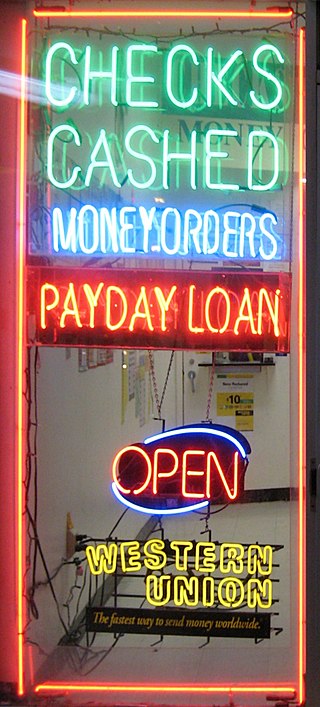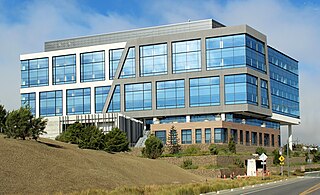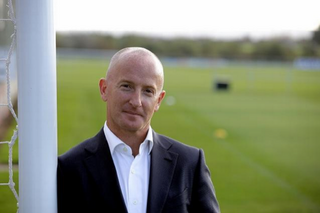
Usury is the practice of making unethical or immoral loans that unfairly enrich the lender. The term may be used in a moral sense—condemning taking advantage of others' misfortunes—or in a legal sense, where an interest rate is charged in excess of the maximum rate that is allowed by law. A loan may be considered usurious because of excessive or abusive interest rates or other factors defined by the laws of a state. Someone who practices usury can be called a usurer, but in modern colloquial English may be called a loan shark.

A payday loan is a short-term unsecured loan, often characterized by high interest rates.
A loan shark is a person who offers loans at extremely high interest rates, has strict terms of collection, and generally operates outside the law.
Peer-to-peer lending, also abbreviated as P2P lending, is the practice of lending money to individuals or businesses through online services that match lenders with borrowers. Peer-to-peer lending companies often offer their services online, and attempt to operate with lower overhead and provide their services more cheaply than traditional financial institutions. As a result, lenders can earn higher returns compared to savings and investment products offered by banks, while borrowers can borrow money at lower interest rates, even after the P2P lending company has taken a fee for providing the match-making platform and credit checking the borrower. There is the risk of the borrower defaulting on the loans taken out from peer-lending websites.
LendingClub is a financial services company headquartered in San Francisco, California. It was the first peer-to-peer lender to register its offerings as securities with the Securities and Exchange Commission (SEC), and to offer loan trading on a secondary market. At its height, LendingClub was the world's largest peer-to-peer lending platform. The company reported that $15.98 billion in loans had been originated through its platform up to December 31, 2015.

Zopa Bank Ltd. is a British online bank which offers deposit accounts, personal loans and credit cards. It began as the world's first peer-to-peer lending company in 2005 and gained a full banking licence in 2020. The peer-to-peer side of its business closed in December 2021.

A payday loan is a small, short-term unsecured loan, "regardless of whether repayment of loans is linked to a borrower's payday." The loans are also sometimes referred to as "cash advances," though that term can also refer to cash provided against a prearranged line of credit such as a credit card. Payday advance loans rely on the consumer having previous payroll and employment records. Legislation regarding payday loans varies widely between different countries and, within the United States, between different states.

Payday loans in the United Kingdom are typically small value and for short periods. Payday loans are often used as a term by members of the public generically to refer to all forms of High-cost Short-term credit (HCSTC) including instalment loans, e.g. 3-9 month products, rather than just loans provided until the next pay day.

Stripe, Inc. is an Irish-American multinational financial services and software as a service (SaaS) company dual-headquartered in South San Francisco, California, United States and Dublin, Ireland. The company primarily offers payment-processing software and application programming interfaces for e-commerce websites and mobile applications.

Wonga.com, also known as Wonga, was a British payday loan firm that was founded in 2006. The company focused on offering short-term, high-cost loans to customers via online applications, and began processing its first loans in 2007. The firm operated across several countries, including the United Kingdom, Spain, Poland and South Africa; it also operated in Canada until 2016, and in Germany, Switzerland, Austria and the Netherlands through the German payments business, BillPay, between 2013 and 2017.
NerdWallet is an American personal finance company, founded in 2009 by Tim Chen and Jacob Gibson. It has a website and app that earns money by promoting financial products to its users.

Errol Damelin is a South African entrepreneur and early-stage technology investor. In 2007 he co-founded Wonga, an internet payday loan company that gained notoriety for charging extremely high interest on short-term loans. After Damelin stepped down as CEO of the company in 2013, the company went into administration on 30 August 2018.
Lenddo was a Singapore-based software-as-a-service company which used non-traditional data comprising social media and smartphone records in order to ascertain customers' financial stability. Its vision was “to improve financial inclusion for at least a billion people" in developing countries around the world. In October 2013, Lenddo had over 350,000 members globally. In October 2017, Lenddo merged with company Entrepreneurial Finance Lab (EFL), and was subsequently named, LenddoEFL
SoFi Technologies, Inc. is an American online personal finance company and online bank. Based in San Francisco, SoFi provides financial products including student loan refinancing, mortgages, personal loans, credit card, investing, and banking through both mobile app and desktop interfaces.
Avant, LLC, formerly AvantCredit, is a private Chicago, Illinois-based company in the financial technology industry. The company was established in 2012 by serial entrepreneur Albert "Al" Goldstein, John Sun, and Paul Zhang. Initially structured as a mid-prime lender, the company issued its first personal unsecured loan in early 2013 using its proprietary technology to determine an individual's creditworthiness.
Zencap was a German company, operating a peer-to-peer lending platform, which allowed private savers to lend money directly to small and medium-sized businesses in Germany, Spain, and the Netherlands. Using the crowdfunding model, the company based in Berlin, Germany aimed to create a direct link between private lenders and small businesses seeking loans. As of December 2014, Zencap had facilitated 5 million Euro in loans to small and medium-sized firms.

Harry's is an American company that manufactures and sells shaving equipment and men's personal care products via online and retail channels. The company is known for their subscription service where customers receive new razor blades, shaving cream, and other grooming products by mail. Harry's is based in New York.

PayU is a Netherlands-based payment service provider to online merchants. The company was founded in 2002, and is headquartered in Hoofddorp. It allows online businesses to accept and process payments through payment methods that can be integrated with web and mobile applications. As of 2018, the service is available in 17 countries. The firm is owned by the Naspers Group, which also owns a stake in one of its sister companies, Tencent.

Affirm Holdings, Inc. is an American public company founded in 2012. It is a financial technology company with a buy now, pay later service for online and in-store purchases. Affirm leads the buy now, pay later sector in the U.S., and reports serving 16.9 million customers and over 266,000 merchants, as of 2023.
Upgrade, Inc. is an American neobank founded in 2016. It has raised $600 million in equity funding and made over $10 billion in loans since its launch in 2017. Upgrade is headquartered in San Francisco, California with offices in Phoenix, Arizona and Montreal, Quebec, Canada. The company offers credit and banking products to consumers and delivers fixed-rate credit cards and loans. The company's other services include credit monitoring and education tools.









